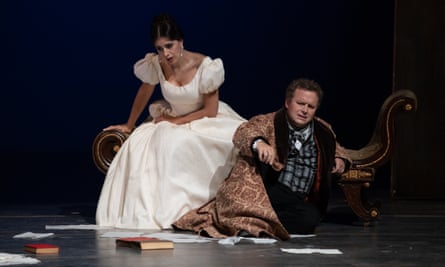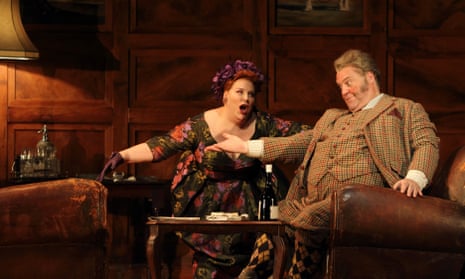“All the world’s a farce.” So ends Falstaff (1893), Verdi’s final opera. Apt words for any day, but the Royal Opera’s production, which opened last Saturday amid football frenzy and Brexit meltdown, could scarcely have been more timely. New in 2012, Robert Carsen’s staging is a portrayal of a late-1950s England still securely harnessed in snobbery, class wars and hunt balls. There’s even a horse named Rupert.
Stylistically distinct from anything the composer had written in the previous half century – not least in being a comedy – Falstaff whoops into action with cascades of rapid string notes, offbeat gusto and great expanses of bright C major. There’s no let up until the final chorus. The Italian conductor Nicola Luisotti drove the tempi way over the speed limit, which sometimes sent the tongue-twisting ensembles awry but gave the performance infectious zest.
Paul Steinberg’s wood-panelled set gives us a Connaught-style dining room, all starched napery and silver cloches, in which Alice Ford, Meg Page and Mistress Quickly – characterised astutely by Ana María Martínez, Marie McLaughlin and Marie-Nicole Lemieux – compare love letters and plot to make a fool of the corpulent sender. The Fords’ Windsor des res boasts a ballroom-sized kitchen with every mod con a merry wife could want. Brigitte Reiffenstuel’s costumes, pinched-waist frocks, pillbox hats, scarlet hunting jackets or Lavender Hill Mob scruff complete a visually detailed picture.
A revival director, Daniel Dooner, and a change of cast has enlivened Carsen’s production immeasurably. The plum was Bryn Terfel, magnificent in the title role, the patina of nearly two decades’ experience giving a salty wisdom to his “Fat Knight”. Whether required to boom or play at coy falsetto or drop to fairy-light pianissimo, Terfel can do it.
The other bonus was Simon Keenlyside as the cocky Ford, hair slicked back, square suit, like Sinatra in Pal Joey, delivering his big “cuckold” aria with dark vehemence and clearly relishing the quickfire joshing with Terfel. Anna Prohaska’s pure-voiced Nannetta stood out, soaring above the mayhem. Hear the Radio 3 broadcast on 22 September.
Last year, Garsington Opera staged a successful new community opera, Silver Birch. This year they have their first world premiere on the main stage, The Skating Rink by David Sawer, with a libretto by Rory Mullarkey based on the Chilean writer Roberto Bolaño’s novel. Told from three perspectives, the opera is set in a seedy Spanish seaside town, late season. Three narrators piece together the story: Gaspar (Sam Furness), the poet-campside attendant; Remo (Ben Edquist), a shiny businessman; and Enric (Grant Doyle), the paunchy civil servant prepared to embezzle local funds for love, building an ice rink for the skater, Nuria (Lauren Zolezzi), object of his and Remo’s passion. Other characters, including two homeless women – persuasively sung by Susan Bickley and Claire Wild – exist on the fringes of society. Alan Oke shows a new, foul-mouthed side as the vagrant, Rookie.
Adroitly staged and designed by Stewart Laing – a few tents, a boardwalk, a multipurpose, Perspex cabin – The Skating Rink grows in intensity with each act. Tough verbal exchanges are offset by magical, chilly instrumental music for the skating scenes, plucked, spiky sounds conjuring an icy underground world. Zolezzi’s double as Nuria, the skater Alice Poggio, pirouetted and twirled on the artificial ice rink, transporting us far from Buckinghamshire heatwave discomfort.
Sawer’s imaginative scoring, using a small ensemble with saxophone, harp, guitar and ukulele-like charango adding Latin accents, shifts freely but precisely from set piece (song, marching band, karaoke scene) to through-written fluidity. Cast and orchestra, conducted by Garry Walker, served the music admirably. I wasn’t engaged by Bolaño’s novel – my shortcoming; it is much admired – but Sawer and Mullarkey gave it heart.
Grange Park Opera staged a new work too, Pushkin, by Konstantin Boyarsky, also a principal violist in the Royal Opera House orchestra. Its librettist, Marita Phillips, a descendent of Pushkin, provided the spur. The work, sung in English, was given its world premiere by the Novaya Opera, Moscow, in GPO’s beautiful new “theatre in the woods”, conducted by Jan Latham-Koenig.

A flamboyant epic with a ball scene and a duel, it covers the last 10 years of Pushkin’s life. Boyarsky hurls mighty energy at the music, encompassing every traditional Russian idiom, at times somewhat naively, from Tchaikovsky to Shostakovich via the Red Army choir, the Orthodox church and, in its filmic sweep, Doctor Zhivago. Pushkin’s high-lying ballads, manfully sung by Peter Auty leading an otherwise Russian cast, could sit well in Les Mis. As a cultural exchange it was admirable. Introducing the work, Wasfi Kani, Grange Park’s founder and spark plug, described the 70-strong Novaya orchestra as having “fire in their balls”. Hard to argue. Despite having to miss the football, Wednesday’s audience cheered wildly. It was an eccentric, roof- raising evening, if not one to repeat until the next World Cup, or maybe the one after.
Oliver Knussen, the British composer who died last week at the age of 66, left a compact body of works. We shouldn’t regret the small number when such a high percentage are pearls. Luckily, Knussen wrote for many genres: Two Organa (1995), the Violin Concerto (2002) or the piano miniature Ophelia’s Last Dance (2010) are fine places to start listening. A virtuosic, complete musician, he was loved and valued for his friendship and generosity. He enriched British musical life. His influence as a conductor and as a selfless supporter of other composers, not just the young, will continue to be felt. This, as well as his glistening music, will be a lasting testament.
Star ratings (out of 5)
Falstaff ★★★★
The Skating Rink ★★★★
Pushkin ★★★
Falstaff is in rep at the Royal Opera House, London, until 21 July

Comments (…)
Sign in or create your Guardian account to join the discussion